#co-writing a book
Text
Making fiction from family memories – Charlie Young
‘I realised I came from an unusual family,’ says Charlie Young, and in that moment came another realisation – there was a story to be uncovered and told. That story became a historical novel, Houdini’s Last Handcuffs, co-written with his sister Cheryl.
But to begin at the beginning, I asked Charlie where the idea of the novel was born.
The idea of Houdini’s Last Handcuffs came from a multitude…

View On WordPress
#Charlie Young#Cheryl Young#childhood#co-writing a book#fiction from childhood#Harry Houdini#historical fiction#Houdini&039;s Last Handcuffs#interview#interviews#magic#making fiction out of fact#using real people in fiction#Vine Leaves Press#Walter Gibson#writing from memories#writing from real life
0 notes
Text

#percy jackson#lockwood and co#mcu#marvel#avengers#the avengers#acotr#crescent city#a court of thorns and roses#book#book lovers#books#meme#memes#i mean. isn't it true?#book tumblr#booklr#WRITING AND ART MEANS SOMETHING#WGA strike#LOTR#the chronicles of narnia#doctor who
2K notes
·
View notes
Photo



Due to recent issue with some people arguing about how ‘AO3 should have algorithm’ and such... I feel like these tweets need to be shared out more. Saw this tweets thread by chance and I had to admit it's a great advice esp on fic writing or fanworks in general.
[Edit] Also since I noticed this post blowing up, if anyone ever tell you that AO3 doesn’t have a function to RECCOMMEND fics you like to others or read other people’s fic recs on the site point them to this post.
[Edit 2] Check source for the original tweet.
[Edit 3] Not OP, but usually when ppl talk about ‘rude or demanding comments’ it usually refers to those that tend to message fanwriters to write according to what they want to be either on the flow of the plot, shipping, etc to the point of harrassment/toxicity. And that would make writing not be fun anymore for some.
#fandom#twitter#i mean#it's not that i can't relate cos I was young once too#and used to obsess about getting kudos and comments#but new kids need to understand that there's a reason why fic archives shouldn't work like socmed#ao3#psa#self reminder when I get concerned abt kudos and comments again#also if you really want ppl to notice your fics... you can actually... promote it?#also in response to 'rude comments' it's more on situations where strangers demand writers to write according to what the readers want and n#or demands asking writers to create something when they didn't want to#which can be excessive#that aside I don't understand why ppl are relating this with published books etc#cos then that'll be a separate issue
6K notes
·
View notes
Photo
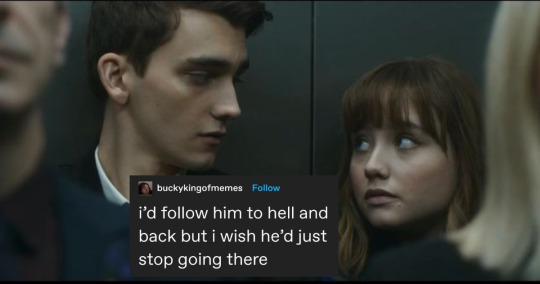
*poking my blorbos with a stick*
#I was gonna write something after the poking my blorbos with a stick thing but my mind blanked and honestly I'll just leave it#it's still very accurate#I love them so much please stop almost getting yourself killed for each other holy shit#if they don't kiss next season I'm sending a formal complaint to Mr. Netflix himself#anyway I'm still clearly very deep into this fandom#also!!!!! I'm over half way into the 3rd book and FUCK it is so good!!!! ughhhhhhhhhhhhhhhhhhhhhhhhhhhh#I'm loving it!!!!!!! If I didn't have a full time job I would have finished it in one day I bet you#anyway#lockwood and co#lockwood & co#lockwood and co netflix#netflix#anthony lockwood#lucy carlyle#as usual I hope no one has done this one already
2K notes
·
View notes
Text

OMG Lockwood came in and started his intro wishing to give Lucy the necklace...!! And she actually cut him off cause she thought he was there about the stupid document signatures 😅
I only noticed now, but i am 100% sure it was like that.
#lockwood and co#lockwood and co books#the empty grave#anthony lockwood#lucy carlyle#rereading lockwood and co#when can i write like that#jonathan stroud#i think it goes above headcanon
107 notes
·
View notes
Text
finally reading tsats here are my live thoughts (spoilers, obviously):
i’m so excited because some pages are darkly decorated and its so cool. still don’t vibe with the title though (the sun IS a star and its peeving me)
why are we talking about dating darth vader 😟 where are we rn (anakin is a yes, but DARTH VADER???)
maybe i’m too old but the jokes are not funny 😭
“this whole place feels like my soul. empty and dark. dark as the pit of the underworld.” <- i don’t care if he’s joking nico would never say thissss 🙏😭 we’re only 10 pages in but please stop butchering my fav character he’s not himselffff i am cringing so bad
i know i’m being dramatic but if they do nico dirty in this book i’m going to end it all
oh my god i don’t think i’ve thought about the words “significant annoyance” in so long. bringing back good memories for sure.
i can tell which parts were written by riordan and which parts were written by oshiro. i don’t think their voices are blending very well together…
also, maybe it’s because it’s the start of the book and they’re trying to familiarise new readers quickly with the characters but it feels like they’re making nico the caricature of ‘emo and shadow and ebony darkness dementia raven way 🥀⛓️🖤’ and will the caricature of ‘happy and sunshine and blonde and flower gleam and glow ☀️🌈🫧’ and i usually like this dynamic when it’s not blatantly pointed out every other page. i have faith they’ll show more complexity than this later on though. future yan will let me know by the end. (future yan here, im not at the end but the characterisation def does get more complex thank gods)
oh ok so it is bob the titan
since when was nico’s actual name niccolo??? how did i forget this detail??
“you have to listen if not you’ll share my fate.” “ominous much?” <- ok he’s finally himself again guys it’s all good
the one-sided beef nico has with percy will never not be funny
“cookie monster appeared over the mouth of the jar, reached inside and gobbled up nico like the chocolate-chip cookie he was.” <- nevermind i’ve gone back to hating this book again
“what was one straight boy when you spent your whole life longing for the impossible?” <- i’m reminded of that time a few years back where everyone made ‘having an unrequited crush on percy’ nico’s whole fanon personality, so i’m glad they addressed this somewhat. this boy has been through so much and people really thought crushing on percy was the biggest thing to focus on about ‘nico angst.’
“we made a mistake. you have to fix it.” <- call me a red flag but if i was nico i would do anything and everything to not go. i would medicate myself so highly on sleeping pills that i can’t dream (doctor bf can go kick rocks). i would track percy and annabeth down and haul their asses into tartarus instead to do it. and if i had to go i would only go in to kill bob myself for sending me those traumatic ass nightmares. no thx. bro willingly jumped in himself and now wants me to save him. nuh uh.
not cupid being will 😭 its like his aphrodite 😭 i am not well.
they always have a really good and emotionally moving scene and they ruin it with a dumb joke. let it be heavy 👏👏
something’s really fishy and i have a feeling that it might not be bob calling for him
if this whole “grumpy ball of darkness” thing continues i will actually lose it
you can’t tell me the percabeth pep talk was actually needed. i will forgive it because i miss them though
im sensing tension in the gap between nico’s connection to the underworld and his relationship with will and i’m here for ittttt. give me the dramaaa
who is the gorgyra girl and why is she in their business sm?
oh shit a will solace pov??? christmas came early 🙏
nevermind that whole nightmare sequence was so fucked up 😭😭
somebody HELP HIM i never thought we would get will angst (nico angst fs, but will???)
DONT JUMP IN THE STYX PLEASE
SOMEBODY TELL HIM HE’S HELPFUL OMG
nico strangling epiales in his sleep is so fucking cool he’s literally HIM he’s literally THAT GUY
#first 100 pages pretty much and im. im. ok.#the whole part with epiales is so cool so far.#unfortunately im not a fan of oshiro’s writing in this book. and i can tell which parts is him bc his authorial voice is so diff to riordan#oshiro isnt a bad writer but… its really really peeving me#i wish riordan had a consultant rather than a co-author. i think he’s in his element when he’s going solo#nico di angelo#riordanverse#incorrect riordanverse#rick riordan#hoo#heroes of olympus#percy jackson#trials of apollo#toa#will solace#solangelo#annabeth chase#meg mccaffrey#lester papadopolous#tsats#the sun and the star#rewriting
184 notes
·
View notes
Text
in a lot of shows that feature a trio, i personally think the show is trying so hard and failing at convincing the viewers that they care about each other all the same even while having a romantic pair in them. "because it's a trio, no one gets left behind" implications meanwhile very obviously pushing the romantic pair above and beyond. lockwood & co however. the main character does not shy away from reminding that the company has three absolute gems despite their surroundings only look at the talented duo, and yes they're both in love, but they are not the only backbones of lockwood & co. "and george."
#i personally vote them as a polycule#but its nice that lucy acknowledge how others are viewing lockwood & co (and wrongly at that)#THIS IS HOW YOU WRITE A TRIO#RIPS THROUGH SCREEN#i havent read the books though so pls do add/correct which ever#lucy carlyle#george karim#george cubbins#anthony lockwood#lockwood#lockwood and co#lockwood & co#gennabi 💬
126 notes
·
View notes
Text
I keep thinking how sad Quill Kipps' whole deal is. He's brought up as a child soldier and he becomes quite good at it, good enough to work at one of the best agencies. He works hard, suffers, loses people, carries on because it's all got to be worth it. He ages in a system that prioritizes youth and feels everything special about him slowly starting to slip away. He has put everything into being an elite agent and he's about to age out of everything he's ever known.
He gets tangled with an unruly bunch of independent agents. They're annoying rule breakers but god they're amazing. Part of his beef with them is he can feel their talent rolling off them in waves making him acutely aware of how his is almost used up. When it becomes unsafe for him to pretend any more, he does what other agents do and becomes a supervisor. He keenly feels the separation from himself and agents in the field and finds he now can't just sit on the sidelines and watch others put their lives at stake when he can't help.
He's adrift, nothing to his name but his old reputation and a set of skills that are no longer useful. He ends up tangled back with the independents because they trust him - need him - and by god does he want to be needed. He wants so desperately to be part of their world again. They find some goggles that allow him to see visitors again and he's like a kid at Christmas. He can finally be involved again! It doesn't have to be over!
While working with them he learns everything he was taught to believe in was a lie, the prestigious agency he gave his entire being for is causing the rise of spirits. Once his involvement is found out, he loses his pension and privileges. He is cut off entirely from his old support system. With nothing left, the independents take him in. He's useful but he knows it's more out of pity. He works hard, almost dies and fights to dismantle the very establishment he spent his best years serving. The battle is won but things stay the same for him.
He is still a young adult clinging with aching fingers onto his childhood and teen years because that was the only way he had purpose. His closest friends are still young teens, five or more years younger than him. He chastises them for their childishness even as he desires more than anything to be one of them. He is Peter Pan, refusing to grow up because there is nothing for him as an adult in haunted England. He does not even look towards his future because he cannot let go of his shining past where he was actually needed.
#lockwood and co#the more I write kipps the more sad I get for him#I grew to like him in the books but getting in his head really hammers home his inherent tragedy#most 21-22 year olds would HATE hanging with 15-16 year olds#but he desperately wants to be one of them again because thats all he knows#the agent system builds these kids up with power and prestige and then throws them to the curb as adults#youre not special anymore not useful#but what is he supposed to do? He stopped education early and he's aged out of his most useful skills#quill kipps
76 notes
·
View notes
Text
The foxes just won another game. Neil waddles over to Andrew to celebrate using his racket cos he’s so exhausted. When he gets there, he smiles at him before falling to the floor. Without a word, Andrew sits down in front of him. They both sit there silently, staring into each others eyes with their foreheads pressed together.
And that’s how the press and fans started speculating about their relationship😋
#I can’t write for shit but they have been taking up 99% of my thoughts for the past 2 weeks and#I keep imagining lil scenarios like this so thought I’d post one if idk#this is probably rlly cringe but wtva💀#HELP THEY HAVE CHANGED MY BRAIN CHEMISTRY#I CANT GO 10 MINUTES WITHOUT THINKING OF THEM#AND THE BOOKS IN GENERAL#I GET HYPERFIXATIONS ALL THE TIME BUT THEY ARE RARELY AS INTENSE AS THIS😭#the last time it was this bad was when young royals s1 first came out and#I felt physically sick if I wasn’t watching the show#like literally#I had a shower and after it I was literally rolling round on the floor cos I felt so sick#love that#yey autism#woop woop#andreil#all for the game#andrew minyard#neil josten#andreil have taken over my life
121 notes
·
View notes
Text
I was reading a fic (angst, major character death, you know the drill) and it made me realize something I knew but hadn't thought about:
Eventually, they'll have to adapt The Final Problem on Sherlock and Co
What the FUCK am I going to do with myself once John 'Jonk' Watson, one of the best to ever do it, thinks his best friend is dead? How am I supposed to survive listening to my beautiful boy just. Fucking lose it?
#sherlock and co#no but im scared now#im always excited to see how ppl chose to adapt the final problem and the empty house#but i think this is the sherlock holmes adaptation that got me to care about watson the most#the books do it well too- at least some of them- but most adaptations write watson very much as the board where Sherlock explains his genius#but in sherlock and co he's an interesting character by himself. i am NOT ready to hear him cry!!!!!
74 notes
·
View notes
Text

Characters from a 1945-set book I’m writing, but also, vintage Locklyle! Used one of the Cameron/Ruby chemistry test pics as a reference 🖤💙
#lockwood and co#save lockwood and co#locklyle#cameron chapman#ruby stokes#anthony lockwood#lucy carlyle#art#sketch#pen#writing#book characters
229 notes
·
View notes
Text
You gave her a free pass just ‘cause you like the way she looks at you.
At first she looks at you in wonder, with slight awe, a country bumpkin in wonder of the big city, and you admit to being flattered. That shine fades away the more she gets to know you, George, the more all of you get to know each other, but it doesn’t disappear entirely.
Instead, it’s tinged with exasperation, a slight roll of the eye here and there, a gobsmacked expression at your nerve (she calls it recklessness, you call it daring), and most times she looks at you like she wants to wring your neck. You admit you are amused. You throw her a roguish smirk and part of you can admit you want to rile her up (-but mostly, mostly you just want to make her laugh, the same way you can’t help but laugh, smile, because of her from that first defiant “I’ll wait”, eyes dark and feral). She looks at you with challenge, demanding if you’re good enough for her, and you admit it’s irresistible.
You’ve always been drawn to dangerous things, and the more you get to know her, you realize Lucy Carlyle is far more dangerous than any Visitor.
Later, under a spell, a ghost’s hold, she looks at you like she loves you - ‘You love me, don’t you?’ It’s not her words, it’s not her actions, it’s not her, just Annabel speaking through her, but - her face, her smile, her eyes as she looks at you are sweet. You don’t know who’s really under a spell between the both of you. ‘You love me, don’t you?’ - the ghost asks through her. It should be an easy enough question to answer, so why can’t you?
She looks at you in pain - I am drowning - and you want so much to save her, even if you are the cause of it. Her tears make you feel as if you’re suffocating along with her, and you’re back to being a little boy again, helpless to save anyone who’s ever mattered. The moment those words leave her mouth, fear grips your heart. Better off dead? Her of all people? You didn’t matter, but she was Lucy Carlyle and that was not the way it was going to be.
She looks at you with eyes full of understanding, absent of the blame you so richly deserve. With apologies falling from your lips and your hand in hers, you can’t help but draw the comfort that you hardly deserve.
You’re still the cause of her tears, and though you don’t deserve it, deserve anything from her, after what you just put her and George through, she looks at you as if she wants you to live - just live.
You’re tired, so very tired - of Kipps, Barnes, of everything. But you come home - to her, and though you admit to feeling a bit off-balance (even if Kipps does deserve it, the pompous prick), she just looks at you, bemused, and you can’t help but sigh. It’s not quite a smirk, not quite a smile, just a slight lift in the corner of her mouth that you are endlessly fascinated by. She promises you tea, and you would promise her anything and everything.
Later on, you don’t know how it could have gone so wrong so fast but she looks at you like she hates you. And you feel like you could almost hate her too. There is bitterness, so much bitterness, that you wonder if you have another Annabel Ward at home, but this is all you - your insecurities, your vulnerabilities. You can admit that you only got that mad because she poked at the exposed heart of you, at open wounds that haven’t even scabbed over.
No matter how you feel though - how she makes you feel - she is still your responsibility. She may prod at open wounds, but you’ll make sure hers are closed and have a chance to heal. She looks at you - she looks at you like she wants so badly for you to believe her. She looks at you like you could break her (which fair enough because you’re pretty sure she can break you too). She looks at you like what you think matters, like you - Anthony Lockwood, not just Lockwood - matter, to her. For the first time, your gaze isn’t fixed on her eyes. Giving in to instinct, it drops.
We can’t let you go.
Who are you fooling?
You trade toast for a smile. Hardly a fair exchange in your opinion. Lucy frowns more often than not, and she keeps her smiles like a secret treasure stuck close to her heart. It is during quiet moments like these in the wee hours of the morning that you feel like an ungainly relic man who would do anything to claim it for your own. Rather than Lockwood’s dazzling acts of courage, it is Anthony who can coax those rare and precious smiles out of her. Pity that you find it so hard to be the boy you once were.
You’re afraid, so very afraid. Once again you feel like that helpless boy, never good enough, never enough. What on earth could you have to offer against Fittes, when that had been her dream and you were just a last resort. You know you sound pathetic, close to pleading, hell you will plead if that’s what it takes, sod your pride - to get her to stay, just don’t leave, don’t leave (me). (Not again). But Lucy never does what you expect, does she? Because she looks at you, she looks at you like you are enough. She looks at you like home. You can’t help if your breath catches and the half-sob that rises along with it. But luckily, for all her Talent, she doesn’t hear.
You were naive. That earlier fear doesn’t even compare to what you feel now. That was juvenile, this is paralyzing. You don’t fear death, not anymore when you fight it on a daily basis for a living. Being ghost locked doesn’t compare to this - fear, paralysis, desperation. For Lucy’s life to be snuffed out and for you to be the cause - your fault, always your fault - sucks all the air out of you. You can’t breathe.
You could almost hate how she looks at you because she looks at you like she’s willing to give you a second chance. You want to so badly - to unburden yourself, to her. But she doesn’t deserve the ghosts you carry (-is what you say to yourself because you’ve always been a narcissistic bastard who wants to look good. Kipps’ voice echoes, in the end she’ll leave and you’ll be the one to make her). Her disappointment is an easy enough pill to swallow because nothing else matters besides the fact that she’s - alive, alive, alive.
She looks at you like you disgust her, as if you were worse than any Visitor. You’re worse because you’re a living corpse who’s already lost your heart. You’ve fallen far from that pedestal, but in a strange way it comforts you because you’re finally being looked at the way you deserve to be looked at. And yet, with tears in her eyes (of which you are once again the cause, it’s always you), she looks at you like she still cares about you. And oh, what a right and proper bastard you are for letting this happen. Because you’ve vowed that you were never going to leave anyone behind the same way you were left behind, but you don’t want her to leave you behind either. (You’ve always been a walking contradiction.)
You’re shaking, you can’t (-breathe, you can’t breathe), but you grip her hair like a lifeline, and she grounds you like a lightning rod, hands cradling your cheeks. You lean in to that warmth (it’s cold, so cold). Her voice calls to you and while you’ve always been a shit Listener, somehow you manage to open your eyes. She looks at you, frantic and half-crazed, but somehow you can finally breathe.
After your unexpected swim, you just want to draw her close, to cradle her as proof of life, but she pushes you away with everything she’s got. It shouldn’t sting as much as it does. You swallow your words. For all that you thought that you couldn’t handle the way she looks at you, at the way it rearranges everything inside of you, the absence of her gaze pierces worse than any rapier. The silence worse.
You would take her biting words over this, relish it even, the chance to parry or to let it land and litter her marks all over your skin. You’d wear those scars proudly.
But then she turns and looks at you, with rage. And even through the haze of exhaustion, you cannot help but think she looks glorious, fiery even as she trails water from the Thames. But with that rage is something that wasn’t there before - fear. She looks at you like she doesn’t know you and that’s worse than anything you’ve experienced tonight. You tell yourself that you can live with her disappointment, but for you to be the reason why this defiant girl cowers and curls into herself is the most unforgivable sin.
You realize you are selfish because even though you’ve sinned against her so much already, you still crave her forgiveness. Even though to remain with you is to risk being dragged down to the depths, you still don’t want her to let you go.
You’ve always known it, Lockwood. You’re a hazard to yourself and the people you love. This is proof.
You apologize, and you await her judgment. She gives you salvation. She makes your heart pound and your blood boil. She makes you remember what it’s like to be alive. And yet, she also quiets your mind and lets you breathe like nothing else. You can’t quite remember what it was like to live before her. She’s the adrenaline in your veins. She’s the great big gulp of air you greedily take in after drowning for who knows how long. She’s quite the walking contradiction too, his Lucy.
With a bland look and a quip, she saves you anew, again and again she keeps saving you, and oh you finally get it. You speak softly because you don’t want to shatter this precious, tender moment. It’s not about how she looks at you, but it’s about how you look at her - how you’ve always looked at her. Her eyes are mirrors which reflect your own, and as you heave in a great ragged sigh, you realize you look at her like you love her - with ache, and tenderness, and gratitude, and awe.
You love her.
Later you fight like you have a lot to live for - and you do - you fight for Lucy and George, and you fight for yourself, for the chance to see them again, for the chance to - just live.
And in the dawning light, though she doesn’t quite smile that smile you adore, her relieved gasp is worth more than front-page news, all the tea in London, and chocolate biscuits combined, because it means that she - they are alive.
Just reckless enough.
And she finally looks at you like she’s proud of you.
#lockwood and co#locklyle#anthony lockwood#lucy carlyle#george karim#george cubbins#books#tv#does this count as fanfic?#you know you're obsessed when you've started writing fanfic#fanfic#fanfiction#lockwood & co#prayer circle for season 2!
513 notes
·
View notes
Text



[id: three pages from Lockwood and Co digital fanzine of "Crimes & Visitors" article./end id]
TEA, TOAST & GHOSTS ZINE IS LIVE!
and here's my full piece for the @teatoastghostszine - an illustrated "Crimes & Visitors" article! with incredible graphic design and formatting by @tangentburd
glad to have partaken in it with a bunch of other amazing artists and writers from l&co fandom! check out whole fanzine over HERE!! it's fully transcribed and free



[id: three digital illustrations featured in the article above:
A digital black and white drawing of young Marissa Fittes and Tom Rotwell at one of their first cases. They are in the countryside, near the crossroads. It's nighttime. Marissa is looking out before her with an oil lantern in one hand and a visible spade handle in another. Her face is washed by a harsh light. Besides her is Tom, kneeling and digging.
A young Fittes agent is climbing out of a manhole at the side of the road, his rapier lying in front of him on the ground. The pavement is covered with salt. The colours are desaturated and harsh, as if someone is taking a photo with a flash.
A simplified map of Holland Park with multiple symbols on it: a cross made of two bones, and seven pins with a wailing ghost on top of each one of them. On the right side is a legend explaining the map symbols: the crosses stand for source locations, and the pins stand for reports of Visitor sightings or psychic disturbances./end id]
#lockwood and co#l&co#tea toast & ghosts#digital art#art#illustration#lockwood and co zine#ttg zine#lockwood and co fanart#book fanart#marissa fittes#tom rotwell#quill kipps#fanzine#fandom zine#zine#described#artpost#my writing? should i make a tag for that?
42 notes
·
View notes
Text
I feel like anyone who's about to embark on attempting to type out a character's accent phoentically (at least as well as one can with English) should probably stop for a moment before they get going and ask themselves, "How would I, myself, feel about a fic where the one character who sounds like me had their speech written out like this and every other character just got their dialogue left in standard spelling?" I feel like a lot of people would tone it down a bit, at least, if they'd done that thought experiment first.
(Anyone who answered "but I don't have an accent!" isn't allowed to write out anyone else's accent, ever. This rule may seem harsh but you need it. Really, you do. Because you've never had anyone treat your accent as abnormal or comical or wrong, so you really don't know what you're inflicting on others here.)
#writing stuff#have you read that fic where the socially prestige accent is the one being carefully typed out “like it sounds”? no? neither have i :(#the obvious note-for-Americans on typing out UK accents is that most of them carry some connotation of class and/or 'education'#within the uk: ask yourself why a Geordie gets typed out but not some dude from the Home Counties#typing out an accent is - usually - a roundabout way of saying “this person talks WRONG! they're not NORMAL!”#you may also find 'Scottish Twitter' informative for the distinction between in-group and out-group 'transcriptions' of accent/dialect#(i use that example only cos I'm Scottish btw)#(oh yes EVERYONE thinks I have an accent! and many of them attempt to replicate it badly in text!)#fun story: one time i had to learn the [IPA] for a linguistics class and the examples were 'standard' English pronunciations#and I went in the next day BAFFLED by why the book insisted that 'boot' and 'foot' don't contain the same vowel sound#(cos they fuckin do don't they?!)#the tutor explained and was v interested in the fact that to me they're the same. i was then asked to demonstrate again for the class.#but i - alas - was not offered repeated examples of however the fuck people say boot and foot in RP :(#(this was IN SCOTLAND btw)#anyway mibbe jist dinnae dae it? mibbe?#and if you do you have use the actual IPA. there now i've made it more trouble than it's worth for most people.
267 notes
·
View notes
Text

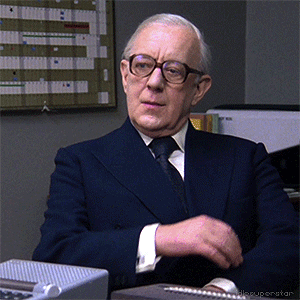
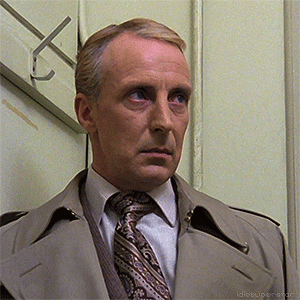
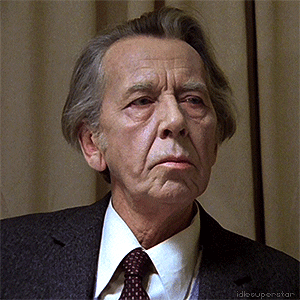
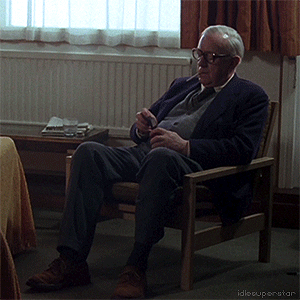
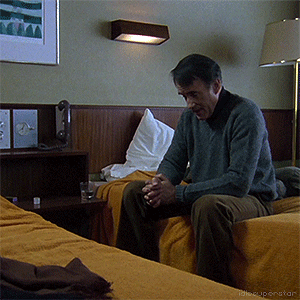

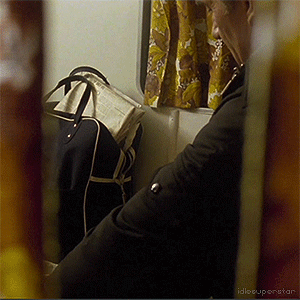


The My-Eyeballs-Are-So-Happy Tinker Tailor Soldier Spy Bluray Watch
Episode 5: Tinker Tailor
- You don't break exactly, you just run out of stories to tell.
#tinker tailor soldier spy#alec guinness#*TTBR#ian bannen#this is the hardest ep to gif I think#(and not just cos there's no guillam in it)#it's an amazing combo of lots of talking saying a lot (like jim talking about his interrogation#and smiley recalling VERBATIM the letter bill wrote about jim#(which is even better and more detailed in the book)#and absolutely no talking but speaking volumes#control's unbelieveable subtle reaction about the news of jim#BILL'S reaction about the news of jim#god there is a whole essay to write about bill's reaction#anyway this gifset is for the anon who asked if I was going to gif more tinker#and made me realise I never finished this run#my wee gifs
98 notes
·
View notes
Text
The role of Pryce and Carter's Deep Space Survival Procedure Protocol Manual in the characterisation, symbolism, and themes of Wolf 359
TL;DR: The DSSPPM is used as a tool to help establish and develop Minkowski and Eiffel as characters: Minkowski as a strict Commander who clings to the certainty provided by a rigid source of authority like the DSSPPM, and Eiffel as the anti-authority slacker who strongly objects to the idea that he ought to read the manual. The way their contrasting attitudes towards the DSSPPM manifest through the show reflect their character development and changing dynamic. The DSSPPM can be directly used against the protagonists by those with power over them, and the reveal of its authorship gives a particularly sinister edge to its regular presence in the show. But it can be also be repurposed and seen through an individual interpersonal lens.
Note: There’s plenty that you could say about the DSSPPM through the lens of what it says about Goddard Futuristics as an organisation, or about Pryce and Cutter as people. Or you could talk about Lambert quoting the DSSPPM an absurd number of times in Change of Mind, and Lovelace’s reactions to this. But in this essay, I’ll be analysing on mentions of the DSSPPM with a focus on Minkowski, Eiffel, and their dynamic.
“One of those mandatory mission training things”: the DSSPPM as a tool to establish characterisation
The first mention of Pryce and Carter's Deep Space Survival Procedure Protocol Manual (the DSSPPM) in Wolf 359 is also the very first interaction we hear Eiffel and Minkowski have. In fact, the first time we hear Minkowski's voice at all is her telling Eiffel off for not having read the manual:
[Ep1 Succulent Rat-Killing Tar]
MINKOWSKI Eiffel, did you read your copy of Pryce and Carter?
EIFFEL My copy of what?
MINKOWSKI Pryce and Carter's Deep Space Survival Procedure Protocol Manual.
EIFFEL Was that one of those mandatory mission training things?
MINKOWSKI Yes.
EIFFEL In that case, yes, I definitely did.
MINKOWSKI Did you now? Because I happened to find your copy of the D.S.S.P.P.M. floating in the observation deck.
EIFFEL Oh?
MINKOWSKI Still in its plastic wrapping.
This is an effective way to establish their conflicting personalities right out of the gate. Minkowski's determination to "do things by the book - this book in fact" contrasts clearly with Eiffel's professed ignorance about and clear disregard for "this... Jimmy Carter thing”. Purely through their attitudes to this one book, they slot easily into clear archetypes which inevitably clash. Everything about Eiffel in that opening episode sets him up as a slacker who doesn't care about authority, but the image of his mandatory mission training manual floating in the observation deck "still in its plastic wrapping" provides a particularly striking illustration.
By contrast, we immediately encounter Minkowski as a strict leader who cares deeply about making sure everything is done according to protocol; the intense importance she places on the DSSPPM is one of the very first things we know about her. Her insistence on the importance of the survival manual might seem somewhat understandable at first, if perhaps unhelpfully aggressive, but it starts to feel less sensible as soon as we start to hear some of the tips from this manual:
Deep Space Survival Tip Number Five: Remain positive at all times. Maintain a cheerful attitude even in the face of adversity. Remember: when you are smiling the whole world smiles with you, but when you're crying you're in violation of fleet-wide morale codes and should report to your superior officer for disciplinary action.
The strange, controlling, vaguely sinister tone of some of the tips we hear in the first episode is largely played for laughs, emphasised by the exaggeratedly upbeat manner in which Hera reads them. But even these first few tips give us some initial suggestions that the powers behind this mission might not care all that much about the wellbeing of their crew members.
It says something about Minkowski that she places such faith and importance in a book which says things like "Failing to remain calm, could result in your grisly, gruesome death" and "when you're crying you're in violation of fleet-wide morale codes and should report to your superior officer for disciplinary action." (Foreshadowing the Hephaestus Station as the home of immense emotional repression and compartmentalising...) Having those kind of pressures and demands placed on her (and those around her) by people above her in the military hierarchy doesn’t unsettle Minkowski.
Eiffel groans and sighs as he listens to the tips, but Minkowski seems to see this manual as an essential source of wisdom. The main role the manual plays in this episode is to establish Minkowski and Eiffel as contrasting characters with very different approaches to authority and therefore a potential to clash.
When Minkowski demands that Eiffel reads the DSSPPM, he decides to get Hera to read it to him, asking her to keep this as “a 'just the two of us, totally secret, never tell Commander Minkowski' thing”. Eiffel seems convinced that Minkowski won't be happy with him listening to Hera read the DSSPPM rather than reading it himself. This suggests that (at least in Eiffel's interpretation) Minkowski’s orders are not just about her wanting him to know the contents of the manual, since this could theoretically be accomplished just as well by him listening to it. But she wants him to do things in what she’s deemed to be the correct way, to put in the right amount of effort, and not to take what she might see as a shortcut. It’s not just about the contents of the manual; it’s about the commitment to protocol that reading it represents.
“When in doubt: whip it out”: Hilbert’s use of the DSSPPM
In Season 1, the DSSPPM isn't purely associated with Minkowski. Hilbert actually quotes it more than she does in the first few episodes. In Ep2 Little Revolución, Hilbert's response to Eiffel's toothpaste protest is inspired by "Pryce and Carter six fourteen: “When in doubt, whip it out - ‘it’ being hydrochloric acid.”" This tip is absurd in a more direct obvious way than those we heard in Ep1. While this absurdity is partly for humour, it also casts further doubt on the usefulness of this supposedly authoritative survival manual, and therefore on the wisdom of trusting Command.
In Ep4 Cataracts and Hurricanoes, Hilbert starts to quote Tip #4 at Eiffel, who protests "I'm not gonna have one of the last things I hear be some crap from the survival manual". These moments again place Eiffel in clear opposition to the DSSPPM, but also suggest that Hilbert's attitude towards the DSSPPM - and therefore towards Command - is closer to Minkowski's than to Eiffel's.
When Hilbert turns on the Hephaestus crew in his Christmas mutiny, his allegiance to Command is revealed as dangerous. And here the DSSPPM comes up again. As Minkowski dissolves the door between her and Hilbert, she triumphantly echoes his own words back to him: "Pryce and Carter six fourteen: “When in doubt, whip it out - ‘it’ being hydrochloric acid.” Never. Fails." This provides a callback to a previous, more comedic conflict on the Hephaestus, and reminds the listener of a time when Minkowski and Hilbert were working together against Eiffel, in contrast to the current situation of Minkowski and Eiffel versus Hilbert. But it also shows that Minkowski, like Hilbert, is capable of using some of the more absurd DSSPPM tips to defeat an adversary. And it shows Minkowski leaning on those tips in a real moment of crisis.
Once Hilbert has betrayed the crew in order to follow orders from Command, we might look back on his quoting of the DSSPPM as casting the manual in a more sinister light, and again calling into question the wisdom of Minkowski placing such trust in it.
“It's not that I don't believe it, I'm just disgusted by it”: the DSSPPM as an indicator of a changing dynamic
The next mention of the DSSPPM is in Ep17 Bach to the Future:
MINKOWSKI Eiffel's been spot-testing me, Hera. He doesn't believe that I've memorized all of the survival tips in Pryce and Carter.
EIFFEL It's not that I don't believe it, I'm just disgusted by it. I keep hoping to discover it's not true.
MINKOWSKI Well, believe as little as you want, doesn't change the fact that I do know them. And so should you!
I think this provides an interesting illustration of the way in which Minkowski and Eiffel’s dynamic has developed since Ep1. They still have deeply contrasting attitudes to the DSSPPM, but this contrast is now a source of entertainment between them, rather than merely of conflict.
Given that Hera wasn’t aware of Eiffel testing Minkowski on the tips, we can guess that it’s a game they came up with while Hera was offline. In the midst of all the exhaustion and uncertainty and fear they were dealing with after Hilbert’s mutiny, this was a way they found to pass the time. It must have been Eiffel who suggested it; Minkowski cites his disbelief as the reason for the spot-testing. And yet she plays along, responding each time, even though this activity has no real productive value.
Minkowski is keen to demonstrate that she does know the tips and she emphasises that Eiffel ought to know them too, but their interactions about the DSSPPM in this episode have none of the genuine irritation and frustration that they displayed in Ep1. It feels almost playful and teasing. Eiffel still thinks Minkowski is "completely insane" for learning all the tips and is "disgusted" by her commitment to memorising them, but these comments feel much closer to joking about a friend's weird traits than to insulting a hated coworker's personality. It feels like something has shifted since Eiffel responded to Minkowski’s passion for the DSSPPM by saying “I'm so glad that your shrivelled husk of a dictator's heart is as warm as a decompression chamber”.
Another thing to note here is that Minkowski's respect for the DSSPPM has clearly survived Hilbert's Christmas mutiny and Minkowski's resulting distrust of Command. From Hilbert's behaviour at Christmas, it's clear that the crew's survival is not at the top of Command's priority list. But Minkowski still trusts the book that Command told her to read. She still thinks Eiffel should read it too. The main figures of authority above her are dangerous and untrustworthy, but she still clings to the source of guidance they provided her with.
It's also worth noting that Minkowski has not just learnt the advice in each of the 1001 tips, but she has memorised (nearly) all of them by number. If it was just about the information that the manual provides to inform responses to potentially life-or-death situations, then knowing the numbers wouldn't be necessary. Nor would it be particularly useful to know them all exactly word-for-word. Minkowski's reliance on the DSSPPM is again suggested to be about more than the potential practical use of its content. It's about showing that she is committed and disciplined and up to the task of leading. She does have some awareness of the strangeness of many of the tips, but this doesn't diminish the value of her adherence to the manual for her:
EIFFEL You're insane.
MINKOWSKI I'm disciplined. Although I will admit they do get more... esoteric as you go higher up the list.
There's only one tip Minkowski doesn't seem to remember, and that's revealing too:
EIFFEL 555?
Minkowski DRAWS BREATH - and STOPS SHORT. [...]
MINKOWSKI Hold on a second, I know this. (beat) Dammit.
EIFFEL Hey, look at that! Looks like there may be hope for you yet.
MINKOWSKI Quiet, Eiffel. Hera, what's D.S.S.P.P.M. 555?
HERA "Good communication habits are key to continued subsistence. Be in touch with other crew members about shipboard activities. Interfacing about possible problems or dangers is the best way to anticipate and prevent them."
This hangs in the air for a second. Then –
EIFFEL So you forget the one tip in the entire manual that's actually helpful?
MINKOWSKI Shut up.
Communication is a key theme of this show, so it’s interesting that this is the one tip Minkowski can’t remember, perhaps indicating an aspect of leadership and teamwork that she doesn’t always prioritise or find easy.
Eiffel saying “Looks like there may be hope for you yet” seems like just a throwaway teasing line, but it’s got a profound edge to it. A lot of Minkowski’s arc is about learning how to provide her own direction and support her crew outside of the systems of authority and hierarchy that she’s grown so attached to. So perhaps Eiffel is right to see a kind of hope in her failure to remember every single DSSPPM tip – she has the potential to break free of her reliance on external authority.
“Which one was 897, what was the exact phrasing of that Deep Space Survival Tip?”: the DSSPPM in interactions with Cutter
The Wolf 359 liveshow, Deep Space Survival Procedure and Protocol, is literally named after the manual. This suggests, before we’ve even heard/watched the episode, that the DSSPPM will be a key symbol here. Which is interesting because I'd say the liveshow has two main plot points: (a) Eiffel's failure to read the DSSPPM or follow orders in general, the resulting disruption to the mission, and his crewmates' frustration with this; and (b) the looming threat of Cutter, the necessity of keeping information from Command, and the risk of fatal mission termination.
Even without the knowledge that Cutter is one of the co-authors of the DSSPPM (which neither the Hephaestus crew nor a first-time listener knows at this point), there's a kind of irony in the contrast between these two plotlines. On the one hand, Minkowski repeatedly berates Eiffel for not having read Pryce and Carter's Deep Space Survival Procedure and Protocol Manual, which was made mandatory by Command. On the other hand, she is aware that Command in general - and Cutter specifically - represents the biggest threat to the safety and survival of her crew.
Cutter uses the DSSPPM against each of the Hephaestus crew in their one-on-one conversations with him. For Minkowski, he uses it as a way of emphasising the expectations and responsibility placed on her:
MINKOWSKI There are always gaps between expectation and reality, but--
CUTTER But it's our job as leaders to close that gap, isn't it? Pryce and Carter...?
MINKOWSKI 414, yes. Yes, sir, I know.
Cutter knows that Minkowski will know those tips and he knows abiding by them is important to her. She's quick to demonstrate her knowledge of the DSSPPM and agree with the tip. There's something deeply sinister to me about Cutter's use of the word 'our' here. His phrasing includes them both as leaders who should be ensuring that things are exactly as expected. It’s almost a kind of flattery at her authority, but it comes with impossibly high expectations. This way of emphasising the importance and responsibilities of her role as Commander is a targeted strategy by Cutter at manipulating Minkowski, designed to appeal to her values.
In Hera's one-on-one, Cutter uses a DSSPPM tip to interpret her behaviour and claim that he can read her motives:
CUTTER This thing you're doing. Asking questions while you get your bearings.
HERA Sir, I'm just curious about--
CUTTER Pryce and Carter 588: Shows of courtesy and polite queries are an efficient way to gain time necessary to strategize.
Unlike with Minkowski (or Eiffel), Cutter doesn't prompt Hera to demonstrate her knowledge of the manual. That wouldn't work as a power play against Hera, who would be able to recall the manual (or, rather, retrieve the file, however that distinction works within her memory) but who doesn't care about the DSSPPM like Minkowski does. Instead, Cutter implies that Hera’s behaviour can be predicted - or at the very least seen through - by the DSSPPM, which seems like a cruel attempt by Cutter at belittling her.
For Eiffel, Cutter uses the manual as a weapon in a different way again. He asks Eiffel, "which one was 897, what was the exact phrasing of that Deep Space Survival Tip?", something which Eiffel clearly doesn't know, but Cutter of course does. This puts Eiffel on the back foot, trying to defend and justify himself, allowing Cutter to emphasise his position of power yet again.
The DSSPPM plays a double role in the liveshow. On the one hand, as Minkowski reminds Eiffel, proper knowledge of the manual "would've saved [the crew] from these problems with the nav computer" – some of the tips can potentially save the crew a great deal of hassle, stress, and risk. On the other hand, the same manual is used by Cutter to manipulate, unsettle, and intimidate the crew. There are these two sides to the information given to the crew by Command - two sides to the manual which Minkowski still values.
In another duality for the DSSPM, the manual is sometimes used as a symbol of the relationship between the crew members and Command, and sometimes used to indicate the dynamics between the individual crew members, usually Minkowski and Eiffel. Before Cutter’s appearance in the liveshow, Minkowski and Eiffel’s discussions of the DSSPPM reflect interpersonal disagreements between two people with fundamentally different attitudes:
MINKOWSKI Oh come on, why do you think I keep trying to get you to go over these things? Do you think I enjoy going through them?
EIFFEL Yes.
MINKOWSKI Well, alright, I do. But this knowledge could save your life.
Minkowski enjoys rules, regulations, and certainty, for their own sake as much as for any practical usefulness. Eiffel very much does not. This is a simple clash of individuals, in which the link between the DSSPPM and Command is implicit. Minkowski doesn't seem to question the idea that the information in the DSSPPM is potentially life-saving, even though she knows Command don't care about their lives. But Cutter’s repeated references to the DSSPPM remind us who made that book a mandatory part of mission training – it certainly wasn’t Minkowski, even if she’s often the one attempting to enforce this rule.
At the end of the liveshow, in a desperate attempt to prevent mission termination, Eiffel promises Cutter that he will read the DSSPPM (the liveshow transcript notes that him saying this is "like pulling teeth"), an instance of the manual being used in negotiations between the Hephaestus crew and Command. All Minkowski’s orders weren’t enough to get Eiffel to read that book, but a genuine life-or-death threat might just about be enough. Perhaps it's ironic that Eiffel reads the survival manual out of a desire for survival, not because he thinks the contents of the book will help him survive, but because he’s grasping anything he can offer to buy the crew’s survival from those who created that same book.
In the final scene of the liveshow, Minkowski catches Eiffel reading the DSSPPM, and he fumbles to hide that he's been reading it, a humorous reversal of all the times that he's lied to her that he has read it. Perhaps admitting that he's reading it would be like letting Minkowski win. Minkowski seems to find both surprise and amusement in seeing Eiffel finally reading the manual, but she doesn't push him to admit it. There's some slightly smug but still friendly teasing in the way Minkowski says "were you now?" when Eiffel says that he was just reading something useful. In that final scene, the manual is viewed again through the lens of Minkowski and Eiffel’s dynamic – Command’s relation to the DSSPPM becomes secondary.
“The first thing I'd make damn sure was hard wired into anything that might end up in a situation like this one”: the DSSPPM as a tool of survival
In Ep30 Mayday, when Eiffel is stranded alone on Lovelace’s shuttle, he hallucinates Minkowski to bring him out of his helpless panic and force him into action. And this hallucination also brings with it one of Minkowski’s interests:
MINKOWSKI Eiffel... I worked on this shuttle. Reprogramming that console.
EIFFEL So? How does that help –
MINKOWSKI Think about it.
BEAT. And then he gets it.
EIFFEL Oh goddammit.
MINKOWSKI What's the first thing that I would do when programming a flight computer? The first thing I'd make damn sure was hard wired into anything that might end up in a situation like this one?
EIFFEL Pyrce and Carter's Deep Space Survival Procedure and Protocol Manual.
Again, a conversation about the DSSPPM gives us an indication of the development of Minkowski and Eiffel’s relationship. Not only does Eiffel imagine Minkowski as a figure of (fairly aggressive) support when he’s stranded and alone, he thinks about what advice she’d give him and he follows it. Rather than dismissing the manual entirely, he looks for tips that are relevant to his situation. He’s not pleased about his hallucinated-Minkowski trying to get him to read the DSSPPM, but that was what his mind gave him in an almost hopeless situation. Some part of him now empathises with Minkowski’s priorities in a way that he definitely wasn’t doing in Ep1. He thinks that the DSSPPM might be on the shuttle because he knows the manual is important to Minkowski. It’s by imagining Minkowski that he gets himself to read the manual in order to see if it can help him survive – he certainly doesn’t think about what Cutter or anyone else from Command would tell him to do.
In the end, the tips Eiffel picks out aren’t all that helpful or informative: “Confront reality head-on”; “In an emergency, take stock of the tools at your disposal. Then take stock again. Restock. Repurpose. Reuse. Recycle."; and “"In times of trouble, an idle mind is your worst enemy”. But Eiffel does use these tips to structure his initial thinking about how to survive on Lovelace’s shuttle. In an almost entirely hopeless situation, Eiffel finds some value in the DSSPPM. But since the tips he picks out are mostly platitudes, the actual wisdom that allows him to survive all comes from his own mind; the tips, like his hallucinations, are just a tool he uses to externalise his process of figuring out what to do.
“Wasn't there something about this in the survival manual?”: Minkowski potentially moving away from the DSSPPM
Given the significance of the DSSPPM in Season 1 and 2 to Minkowski in particular, it feels notable when the manual isn’t referenced. Unless I've missed something (and please let me know if I have), Minkowski – the real one, not Eiffel’s hallucination - doesn't bring up the manual of her own accord at all in Seasons 3 or 4. This might make us wonder if she’s moved away from her trust in and reliance on that book provided by Command.
Perhaps the arrival of the SI-5, which highlights to Minkowski that the chain of command is not a good indicator of trustworthy authority, was the final straw. Or perhaps the apparent loss of Eiffel - and any subsequent questioning of her leadership approach, or realisations about the valuable perspective Eiffel provided - were what finally broke down her faith in that book.
Alternatively, perhaps Minkowski still trusts the DSSPPM as much as ever, but trying to get Eiffel or any of the other crew members to listen to it is a losing battle that she no longer sees as a priority. Either way, Minkowski’s apparent reluctance to bring up the DSSPPM feels like a shift in her approach.
The associations between Minkowski and the DSSPPM are still there in Season 3, but they are raised by other characters, not by Minkowski herself. The manual is used to emphasise Eiffel’s difficulties when he’s put in charge of trying to get Maxwell and Hera to fill out a survey in Ep32 Controlled Demolition. Trying to force other people to be productive pushes Eiffel into some very uncharacteristic behaviour:
EIFFEL Jesus Christ, what is wrong with you? It's like you've never even read Pryce and Carter! Tip #490 very clearly states that –
He trails off. After a BEAT –
HERA Officer Eiffel?
MAXWELL You, uh, all right there?
EIFFEL (the horror) What have I become?
[...]
Eiffel, now wrapped up in a blanket, is next to Lovelace. He is still very clearly shaken.
EIFFEL ... and... it was like an episode of the Twilight Zone. I was slowly transforming into Commander Minkowski. [...] It was a nightmare! A terrifying, bureaucratic nightmare!
This is a funny role reversal, but it shows us the strength of Eiffel’s association between Minkowski and the DSSPPM, as well his extreme aversion to finding himself in a strict bureaucratic leadership position. It also suggests that becoming extremely frustrated when trying to get other people to do what you want might make anyone resort to relying on an external source of authority, such as the manual. I don’t know whether this experience helps Eiffel empathise with Minkowski, but perhaps it might give us some insight into how her need for authority and control in the leadership role she occupied might have reinforced her deference to the DSSPPM.
In Ep34, we get a suggestion of another character having a strong association between the DSSPPM and Minkowski. After the discovery of Funzo, Hera asks Minkowski what the manual says about it:
HERA Umm... I don't know if this is a good idea. Lieutenant, wasn't there something about this in the survival manual?
MINKOWSKI Pryce and Carter 792: Of all the dangers that you will face in the void of space, nothing compares to the existential terror that is Funzo.
It’s interesting to me that Hera asks Minkowski here. We know from Ep1 that “Pryce and Carter's Deep Space Survival Procedure Protocol Manual is among the files [Hera has] access to”. Two possible reasons occur to me for why Hera might ask Minkowski about the DSSPPM tip here. One possibility is that Hera thinks that retrieving the manual from her databanks and finding the correct tip would take her more time than it would take for Minkowski to just remember the tip. Which suggests interesting things about the nature of Hera’s memory, but also implies that - at least in Hera's view -Minkowski’s knowledge of the DSSPPM is more reliable than that of a supercomputer.
The other possibility is that Hera could have recalled the relevant DSSPPM tip incredibly quickly but she doesn’t want to, maybe because she resents having that manual in her head in the first place, or maybe because she wants to show respect for Minkowski’s knowledge as a Commander. Either way, we can see that Hera – like Eiffel – strongly associates Minkowski with the DSSPPM.
And Minkowski, even if she wasn’t the one to bring up the manual here, recalls the relevant tip immediately. Perhaps she is moving away from her trust in that manual, but everything that she learned as part of her old deference to the authority of Command is still there in her head. She might want to forget it by the end of the mission, but that’s not easily achieved. The way Minkowski’s friends/crewmates associate the manual with her emphasises the difficulty she’ll face if she tries to move away from it.
“One thousand and one pains in my ass”: The authorship of the DSSPPM
In Ep55 A Place for Everything, Eiffel effectively expresses his long-held dislike of the DSSPPM when he comes face-to-face with both of its authors:
EIFFEL What? What the hell are - wait a minute - Pryce? As in one thousand and one pains in my ass, Pryce? (sudden realization) Which... makes you...?
MR. CUTTER (holding out his hand) W.S. Carter, pleased to meet you.
It’s significant that the two ‘big bads’ of the whole series are the authors of the manual which Minkowski and Eiffel were bickering about all the way back in Ep1. It’s not the only way in which the message of this show positions itself firmly against just accepting externally imposed authority and hierarchy without question or evidence, but it does reinforce this ethos.
By being the authors of the manual, Cutter and Pryce have had a sinister hidden presence throughout the show. Long before we know who Pryce is and even before we hear Cutter’s name, their manual is there, occupying a prominent place in Minkowski’s motivations and priorities, and in her arguments with Eiffel. It’s not at all comparable to what Pryce put in Hera’s mind, but it is another way in which these antagonists have wormed their way into the heads of our protagonists.
Minkowski will have to come to terms with the fact that the 1001 tips she spent hours memorising and reciting were written by two people who would have killed her, her crew, and even the whole human race without hesitation if it served their purposes. We never get to hear Minkowski’s reaction to learning the identities of Pryce and Carter, but I think processing the role of their manual in her life will be a long and difficult road that’ll tie into a lot of other emotional processing she needs to do. Her assertion to Cutter that, without him, she is “Renée Minkowski... and that is more than enough to kick your ass!” feels like part of that journey. She doesn’t mention the DSSPPM at all in Season 4. She’s growing beyond it.
"Doug Eiffel's Deep Space Survival Guide": The DSSPPM as a weapon against those who wrote it
Last but not least, I couldn’t write about Eiffel and the DSSPPM without mentioning this scene from Ep58 Quiet, Please:
EIFFEL As someone once told me: "Pryce and Carter 754: In an emergency, take stock of the tools at your disposal, then take stock again. Repurpose, reuse, recycle." And right now? You know what I got? I got this lighter from when Cutter was using me as his personal cabana boy. [...] and I've got myself this big, fat copy of the Deep Space Survival Manual, and you know what I'm gonna do with it? [...]
Eiffel STRIKES THE LIGHTER. And LIGHTS THE BOOK ON FIRE, revealing Pryce just a few feet away from him!
EIFFEL I am going to repurpose it... and reuse it... and recycle it into a GIANT FIREBALL OF DEATH!
And he swings the flaming book forward, HITTING PRYCE ON THE SIDE OF THE HEAD. [...]
EIFFEL That's right! Doug Eiffel's Deep Space Survival Guide, B-
No one other than Doug Eiffel could pull off the chaotic energy of this moment. It doesn’t get much more anti-authority than lighting the mandatory mission manual on fire and using it as a weapon against one of its malevolent authors. It might not be the wisest move safety-wise, and it certainly doesn’t improve the situation when the node gets jettisoned into space. But there is still a powerful symbolism in taking a symbol of the hierarchical forces that have tried to constrain you for years and setting it alight to fight back against those forces. Eiffel takes his own approach to survival and puts his own name into the title, an assertion of his agency and rejection of Command's authority.
The DSSPPM tip that he uses here is one of those he considers when stranded on Lovelace’s shuttle. It’s understandable that after that experience it might have stuck in his memory.
I can’t help feeling that the line “as someone once told me” has a double meaning here. The immediate implication is to interpret “someone” as being Pryce and Cutter – it’s their manual after all – which makes this line a fairly effective ‘fuck you’ gesture, emphasising how Eiffel is using Pryce’s manual against her in both an abstract and a physical sense.
But I think “someone” could also mean Minkowski. Eiffel uses a singular rather than plural term, there’s already an association established between Minkowski and the DSSPPM, and, in Mayday, it’s his hallucination of Minkowski that gets him to read this tip. She's probably also recited this tip to him at other points as well. Under this interpretation, this line is as much a gesture of solidarity with Minkowski as it is a taunt to Pryce. I like the idea that these two interpretations can run alongside each other, reflecting the duality of the use of the DSSPPM that I talked about in relation to the liveshow.
Conclusion
The DSSPPM is a symbol of external rules imposed on people by those with power over them. These rules can be strange, arbitrary, and even sinister, but for those with a desire for certainty and control, like Minkowski, they can be tempting. And they can have their uses, as well as the potential to be repurposed. Attitudes towards these rules provide an effective shorthand as part of Minkowski and Eiffel’s characterisation. And the clash between these attitudes, and how that clash manifests, can tell us something about how the dynamic between those characters develops and changes.
#Wolf 359#w359#Renee Minkowski#Doug Eiffel#Renée Minkowski#I guess I lied when I said I was halfway through at 1000 words#I hope that those who liked my preview post were up for a long read#This is over 5000 words and I still haven't said everything!#You could write a PhD thesis on this#Honestly I feel like this is full of typos and mistakes cos I was kinda tired as I proofread it but I just want to get it posted today#Otherwise I could spend even more time on it and make it even longer... (and also I want it to be out in the world)#But please do lmk if you spot a typo/mistake. I won't be offended#I'd also be interested to hear people's thoughts on any of this#Unimportant point but I'm shaking my head at Minkowski if she wouldn't let Eiffel listen to the DSSPPM instead of reading it#Audiobooks are a valid method of reading. Don't deny a man with ADHD his own approach to absorbing info!#Then again. it might have been an unfounded assumption of Eiffel's that Minkowski wouldn't have accepted him listening to it#I think in school he definitely got in trouble for boasting that he's actually read the book this time when he just watched the film#the empty man posteth
147 notes
·
View notes